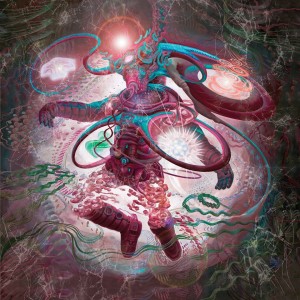
To say that The Afterman: Ascension was a comeback any less miraculous than the 1980 Olympics is an injustice. Coming off a twofold lineup change and the worst album of their career, prog rockers Coheed and Cambria released the first half of an ambitious double album to great acclaim. Ascension showed the group returning to inescapable melodies and unpredictable instrumentation, as well as adding a coherence to the band’s storyline (all the albums are stories taking place in a sci-fi universe) that simply wasn’t there in previous efforts. Ascension featured songs that will be added to the Coheed canon as either epic songs per Coheed’s usual (“Domino The Destitute”, “Mothers of Men”) or bold, successful new experiments (“The Afterman”, “Subtraction”). How is a band to follow that up? 
By releasing the next half with even more instant-classic songs and even bolder experiments, and hoping for the best. Even if The Afterman: Descension, out February 5th, doesn’t quite come out on top of its companion Ascension (released last October), it’s still undeniably Coheed, and undeniably good. No. Sorry. Great.
Where to begin? Perhaps by saying that the first five tracks of Descension are one continuous knockout. The album begins haunting “Pretelethal”, which somehow balances a ukelele and a Gothic refrain that would sound at home in a heavy metal rendition of the climax of Macbeth. Thereafter Coheed drops us into”Key Entity Extraction V: Sentry The Defiant”, the song I’m going to go ahead and call the best on either part of The Afterman, because of its infectious chorus (“And I’ll be defiant / The lion / Giving them fight that will open their eyes”), thick and vivid instrumentation, and overall fierceness. As if there weren’t enough, then we get the one-two punch of the ferocious “The Hard Sell” and “Number City”, a strangely groovy-poppy-punky mutant of a track that somehow comes out as one of the most colorful in Coheed’s history. Then and only then does the streak of classics close out with the seven-minute “Gravity’s Union”, a dark, rolling epic that comes to a close with a bravado and a drama that simply cannot be ignored.
The second half of the album is, I’m sorry to say, noticeably more full of stumbles. “Away We Go” and the emotional final track, “2’s My Favorite 1”, are both possible classics too, but the seventh and eighth songs, “Iron Fist” and “Dark Side Of Me”, just don’t live up to the rest of the album. They’re not bad, but they are repetitive, sometimes maddeningly so. It’s just not what I’ve come to expect from Coheed, and I don’t mean that in a good way. Of course, just as with most of Coheed’s dud songs, the album subsumes them into part of the narrative experience, but these two just don’t stand alone, and that drags Descension down to just inches behind Ascension in my estimation.
Let’s get this straight, though: this is not a return to the dull music that comprised 2010’s Year of the Black Rainbow. In fact, it’s full of songs that are unquestionably Coheed’s best (including “2’s My Favorite 1”, despite its not being in that phenomenal first five songs). The cool sci-fi interludes, which do wonders to explain just what the heck is going on in the album’s weird story, are still here, as are Coheed’s trademark melodies and Claudio’s chilling voice. The Band is Still Back, ladies and gentlemen. Not every album can be perfect, and so I have no worries for Coheed’s future. Taken as one 18-song whole, The Afterman would unquestionably be Coheed’s best album, topping even In Keeping Secrets. If split into two halves … well, there can only be one winner in the Super Bowl, too, but that doesn’t mean the losing team isn’t great at what they do. Score: 8.25/10.
Jake Bittle / A&E Editor
